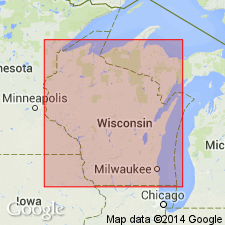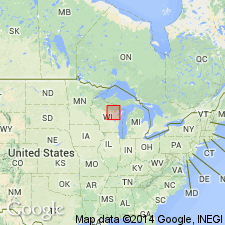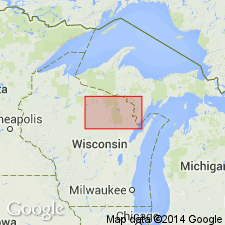
- Usage in publication:
-
- Peshtigo River porphyry
- Modifications:
-
- First used
- Dominant lithology:
-
- Porphyry
- AAPG geologic province:
-
- Lake Superior region
Summary:
First published use as map unit in McCaslin syncline in the area east of Thunder Mountain, western Marinette Co, WI (Lake Superior region). A dark-grey porphyry found at the High Falls dam and northward near the middle of Hill Falls reservoir is referred to as the "Peshtigo River porphyry." Type locality not designated. Derivation of name not stated. Is noted to occur at field trip Stop 5. Described as "nearly black on fresh surface. Weathered faces show abundant small phenocrysts of whitish feldspar and numerous small black pellets of included mafic material...the grey porphyry takes on a pinkish coloration for a distance of about 3 ft from the contact" with the pink Hager rhyolite (first used). Is locally "intruded (or replaced) in irregular patches by the reddish hornblende-rich" High Falls granite (first used). "A small patch (1 x 1 ft) of pink Hager occurs in the gray porphyry... ." Age is not stated. Is shown on geologic sketch map (p. 3).
Source: GNU records (USGS DDS-6; Reston GNULEX).

- Usage in publication:
-
- Peshtigo Monzonite
- Modifications:
-
- Redescribed
- Revised
- Geochronologic dating
- Dominant lithology:
-
- Monzonite
- Porphyry
- AAPG geologic province:
-
- Lake Superior region
Summary:
Redescribed as monzonite and monzonite porphyry. Is a lithodemic unit of the Wolf River batholith in central and northeastern WI in the Lake Superior region. Type not designated; derivation of name not stated. [Appears to be same as "Peshtigo River porphyry" of Read and Weis (1962); "River" dropped from geographic name.] Generalized geologic map shows contacts with undifferentiated Paleozoic rocks, Belongia Granite, High Falls Granite, and Precambrian rocks older than 1,450-1,500 m.y. U-Pb concordia intercept age of about 1,500 m.y. is considered most reliable age estimate of the batholith. Peshtigo Monzonite and Peshtigo Monzonite Porphyry distinguished by dark-gray to brown color, paucity of quartz, and relative abundance of mafic minerals. Monzonite: medium grained (3 mm) and slightly porphyritic; contains plagioclase and alkali feldspar in subequal amounts, and fayalitic olivine, orthopyroxene, clinopyroxene, amphibole, biotite, opaque minerals, and traces of interstitial quartz. Porphyry: mineralogically equivalent to monzonite, with abundant feldspar and olivine phenocrysts in fine-grained groundmass. Bulk chemical analysis given. Age is Middle Proterozoic.
Source: GNU records (USGS DDS-6; Reston GNULEX).

- Usage in publication:
-
- Peshtigo Mangerite*
- Modifications:
-
- Redescribed
- Dominant lithology:
-
- Monzonite
- AAPG geologic province:
-
- Lake Superior region
Summary:
Redescribed as Peshtigo Mangerite. Rock is coarse-grained, inequigranular with subhedral, normally zoned plagioclase, alkali feldspar, mafic silicates (fayalite, hypersthene, ferroaugite-hedenbergite, hornblende and biotite), interstitial quartz and accessory apatite, zircon, ilmenite and magnetite. In places unit is a porphyry containing abundant feldspar and olivine phenocrysts in fine-grained matrix. Two small bodies delineated within map area near northeastern margin of Wolf River batholith, Lake Superior region, and near anorthosite in Green Bay 1 degree X 2 degrees quadrangle. Unit is in part coeval and possibly cogenetic with anorthosite unit. Age is Middle Proterozoic. [Monzonite is retained as keyword for this unit.]
Source: GNU records (USGS DDS-6; Reston GNULEX).
For more information, please contact Nancy Stamm, Geologic Names Committee Secretary.
Asterisk (*) indicates published by U.S. Geological Survey authors.
"No current usage" (†) implies that a name has been abandoned or has fallen into disuse. Former usage and, if known, replacement name given in parentheses ( ).
Slash (/) indicates name conflicts with nomenclatural guidelines (CSN, 1933; ACSN, 1961, 1970; NACSN, 1983, 2005, 2021). May be explained within brackets ([ ]).

